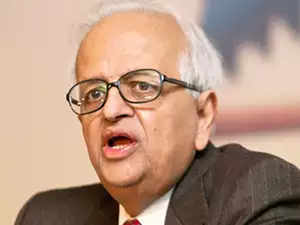Government measures to deal with coronavirus impact ‘very positive’: Former RBI Governor Bimal Jalan

Former Reserve Bank Governor Bimal Jalan

COVID-19 CASES
WorldIndiaConfirmed165,799Deaths4,706Confirmed5,808,946Deaths360,308NEW DELHI: Former Reserve Bank Governor Bimal Jalan on Thursday described the initiatives taken by the government to mitigate the impact of COVID-19 as “very positive” and hoped that these would help in containing the decline in growth.
He further said that unlike in 1991, when the country faced a balance of payments crisis, today India has resources as well as forex reserves to deal with any eventuality.
“All the measures announced by her (Finance Minister Nirmala Sitharaman) are very positive.
“But as you have rightly said these are all supply side, not demand side. In terms of the economy, one does not expect higher fiscal deficit to lead to a higher economic growth in macroeconomic sense,” Jalan told in an interview.
Earlier this month, the government announced a Rs 20.97 lakh crore economic package, which included RBI’s Rs 8.01 lakh crore worth of liquidity measures.
Sitharaman had unveiled the package in five tranches, which included Rs 3.70 lakh crore support for MSMEs, Rs 75,000 crore for NBFCs and Rs 90,000 crore for power distribution companies, free foodgrains to migrant workers, increased allocation for MGNREGS, tax relief to certain sections and Rs 15,000 crore allocated to the healthcare sector.
On criticism that India’s economic package was too less compared to packages unveiled by countries like the US and UK, he said developed and developing nations are very different.
“If you look up at developed countries, I mean their rate of growth is say 2 per cent or 3 per cent and they have a large per capita income and so on.”
“For developing countries’ point of view, you want a high rate of growth, say at least 6 per cent or 7 per cent, and you also want inflation to be under control so that per capita income increases,” Jalan noted.
Asked if India’s present economic crisis is as big as the 1991 balance of payment crisis, he said, “The 1991 economic crisis was very different, we had a balance of payment problem of a very deep kind. We did not have sufficient forex reserves.”
“Today we have resources and high forex reserves,” Jalan, also a former member of Parliament, pointed out.
So the current circumstances are very different from 1991, he said, adding, “Today we have the ability to do what we want to do.”
On whether he supports monetisation of deficit by the central bank, the former RBI governor said it is not a question of support or non-support as it depends on the situation.
“In particular circumstances, you can monetise, in other circumstances, you give liquidity to the market and liquidity for the borrowers,” he opined.
Monetisation is loosely referred to as printing of currency by the central bank for the government to take care of any emergency spending and to bridge the fiscal deficit.
On the country’s macroeconomic situation, Jalan said growth rate is going to fall significantly.
“Last year it was 5.2 per cent, this year estimates vary from minus 1 or minus 2 to 2 per cent at the most.
“So economy is more or less static and the impact of whole coronavirus on the economy has been quite negative,” he said.
Rating agencies like Fitch and Crisil have drastically cut India’s economic growth forecast for the current fiscal year due to the coronavirus lockdown.
Fitch has estimated 5 per cent contraction in 2020-21, a sharp decline from 0.8 per cent growth projected by the global rating agency in late April.
Crisil also predicted the economy will shrink by 5 per cent in the current fiscal. Earlier, it projected a growth of 1.8 per cent.
India has seen four instances of contraction in GDP since 1951-52, the earliest period for which GDP data is available in the 2004-05 GDP series. These took place in the fiscals 1957-58, 1965-66, 1972-73 and 1979-80.
Source: indiatimes.com

